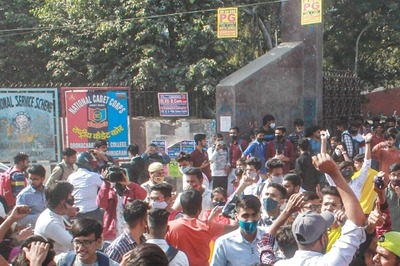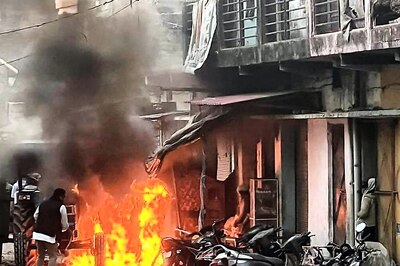
views
- Send thank you notes to people who helped with the funeral, made monetary donations, or gave gifts like food or flowers.
- Don’t feel obligated to send thank you cards after a funeral. They’re a nice way to show your appreciation, but your mourning should come first.
- Write short, specific messages to thank them for what they did (or gave you), and consider adding a personal anecdote about your relationship or their relationship to the deceased.
Who should you send thank you notes to after a funeral?

Send thank you notes to anyone who gave you extra support. While you don’t need to send thank yous to everyone who came, it’s kind to show your appreciation to those who supported you through this time. Whether they brought you food, spoke at the funeral, helped you organize, etc., consider sending them a short thank you card. Thank people who brought gifts and flowers or made monetary donations to your family or to a charity in the name of your loved one. Some people also send thank yous to the professionals who helped with the funeral—either people in religious orders or funeral home staff members.
Example Funeral Thank You Notes

Close friends and loved onesI know you and ____ were close, it meant so much to see you at the service. Their passing was very hard for me, and I’m really grateful for all of your support. Your words at the ceremony really touched my heart, thank you so much for coming. It’s always a joy to see you.

People who brought flowersBells of Ireland were _____’s favorite flower, thank you so much for bringing them. The arrangement was so beautiful, I know they would’ve loved it. Your wreath looked absolutely beautiful at the service, receiving it meant so much to my family and me. Thank you for your thoughtfulness.

People who gave donationsYour support relieved so much stress, I’m so grateful I didn’t have to worry about the gravestone. We’re giving _____ a beautiful epitaph with your donation. Thank you for donating to Sloan-Kettering in ______’s name, they would be grateful that you’re supporting other people battling cancer. We really appreciate it.

People who helped you during the funeralThank you for bringing that delicious casserole, not having to cook made focusing on the ceremony much easier on me. Thank you for watching my kids, knowing they were with you helped me get through all the planning. If someone sent you a note, you can just say: Thank you for your note, your words were very touching.

People who helped with the funeralThank you for helping me so much with organizing everything, I couldn’t have done it without you. The service was so beautiful, thank you so much for everything you did. Your continued support means everything to me during this difficult time.

Funeral home staff and clergy (if applicable)Thank you for helping make _____’s celebration of life so special. Our whole family is very grateful, we couldn’t have done it without you. Your words brought Spirit to the service. I was so incredibly moved, thank you. Thank you for helping send ______ to the hands of God. I’m glad you could be part of the service.
How to Write a Funeral Thank You Card

Write one or two specific, heartfelt sentences. Condolence thank you letters don’t have to be long—one or two lines that acknowledge the recipient’s specific actions are enough to convey your appreciation. Say exactly why you’re writing them—mention any gifts or donations that they gave. If you’re especially close to the person you’re thanking, sharing a personal anecdote or story from the life of your loved one is a kind way to show your appreciation (but isn’t strictly necessary).

Avoid mentioning how much money they gave you. If you’re writing a thank you note to someone who gave a monetary donation in memory of your loved one, thank them for their donation, but don’t mention how much they gave. Simply say that you are thankful for their generosity in honoring your deceased loved one. Good phrasing for a monetary donation might read like "Thank you for your generosity in our time of grief. The donation in honor of _______ means a lot to us."

Use the person’s full name and home address. If your thank you notes are physical, send them directly to the person’s address. Since some funeral notes are distributed more formally, write the person’s first and last name, as well as your own. If you’re very close with someone you don’t have to put either of your full names, except for in the address.

Sign the card with your name or from “The family of ______.” If you’re sending a personal letter to a close friend—say someone watched your children while you were out making arrangements—sign it with your first name. If you don’t know the person very well, sign with your first and last name or as “The family of ____.”
Sending the Notes

Send them out within 3 months of the funeral. General etiquette rules dictate that thank you notes should be sent within two weeks, but funeral thank yous are an exception. Your friends and loved ones know you’re grieving and will appreciate any note at all, even if it’s several months later.

Solicit help if you need it. If writing dozens of thank yous feels overwhelming, don’t hesitate to ask those around you for help. Even if it’s sending someone to the post office to buy you stamps or envelopes, delegate tasks to close friends or family members. It’s also appropriate for people to write on your behalf.

Remember that thank you notes are not a requirement. Finally, don’t feel bad if you don’t get around to thank you notes. While they’re generally a key component of good etiquette, during times of grief, etiquette can take a backseat to mourning. If you can’t emotionally get through the thank you notes, that’s more than okay.




















Comments
0 comment